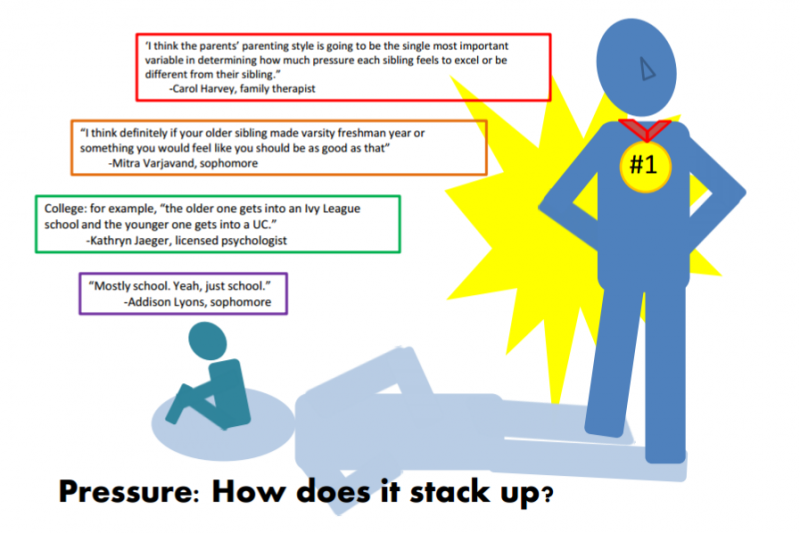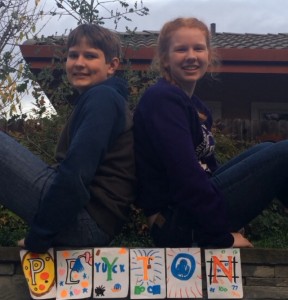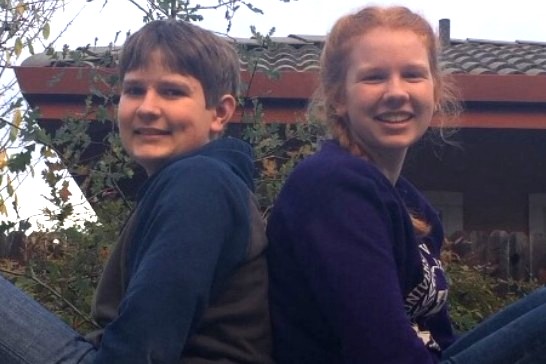Younger siblings deal with standards set by older siblings
 By Claire Alongi and Annie Brennan,
By Claire Alongi and Annie Brennan,
Bluedevilhub.com Staff–
When Mitra Varjavand was signing up for sophomore classes, she decided to take on AP Chemistry. Initially, Varjavand wasn’t sure about taking the class, but her older brother, senior Bijan Varjavand, convinced her that she should go for it.
“He was like, ‘Oh AP Chem was easy, you should just take it sophomore year,’” Mitra said. But it hasn’t proven to be as easy for Mitra as it was for Bijan.
Like many younger siblings, Varjavand is finding herself standing in a shadow cast by her older sibling. Whether the tower of expectations takes the shape of a valedictorian, star athlete, or socialite extraordinaire, pressure can rest on the shoulders of the little sibling to live up to the standards set by their older brother or sister.
However, these pressures are often not visible. Take sophomore Addison Lyons. Despite doing well academically, Lyons still feels pressure to live up to the example of her older sister Peyton, who graduated from Davis High just last year. 
other. Here freshman Weston (left) and sophomore Addison Lyons (right) show support for their older
sister Peyton Lyons who is currently a freshman at the University of Washington.
“I look at all the grades she got and realized that I, like, want to get those grades,” Addison said.
According to Mitra, her brother’s academic success has put extra expectations on her.
“He’s taken really hard classes and persuaded me to take them, because they were easy for him. But they’re not easy for me, and my parents don’t realize that sometimes, like they think I can keep up, I guess,” Mitra said.
Licensed psychologist Carol Harvey believes that older siblings do not generate the pressure themselves.
“It may come from parents, grandparents, teachers or others who compare the siblings, or from the younger sibs themselves,” Harvey said.
According to a LiveScience report on sibling competition, “Later born children might feel extra pressure to be competitive, and might try to out-do their older siblings in the hopes of gaining extra attention from parents.”
Junior Claire Drown said that in addition to younger siblings dealing with standards set by their older siblings, other people can be prone to making judgments about someone due to preconceived ideas about their relatives.
“There’s certainly a kind of an extra expectation of whether you will live up to their performance,” Drown said. With two older cousins who have walked the halls of DHS, she occasionally feels the rippled effects of their legacy.
“If my teachers have liked my relatives, they’re usually friendlier at the beginning and it’s easier to get to know them, and that’s really helpful,” Drown said.
But Drown has also had some experiences “on the flip side,” namely when a teacher recognized her name on his roll call sheet from teaching her cousin in the past. He asked her if she would fall asleep in his class.
“So, I said no,” Drown said with a laugh and a hint of a smirk.
Both Addison and Drown have younger brothers as well, who may experience the pressures of standing in an older sibling’s shadow as well.
“I think because Peyton and I are really motivated in school […] I think he feels like he should be motivated in school,” Addison said. However, she is not sure whether her brother feels the pressure to folllow her example.
But it is not all doom and gloom for the younger siblings. Even with their older sibling’s success staring them in the face, many younger siblings have to admit having a big brother or sister isn’t all that bad.
“Oh, our relationship is really strong I think […] [My brother’s] a good friend to have,” Mitra said.
Addison agrees, saying she generally gets along with her older sister, as evidenced by their casual texting conversations and SnapChats.
“I believe it works best for parents to bring up children (sibs) by encouraging them not to be in competition with each other. I have encouraged parents to emphasize whatever strengths each child has,” former school counselor Judith Blum said in an email.
Mitra has a similar thought.
“I don’t mind being compared to my brother, because he’s not a bad kid and he’s smart too, but like sometimes it’s annoying like if people think we’re so similar, but we’re not. Just because we’re siblings doesn’t mean we think the same way,” Mitra said.




